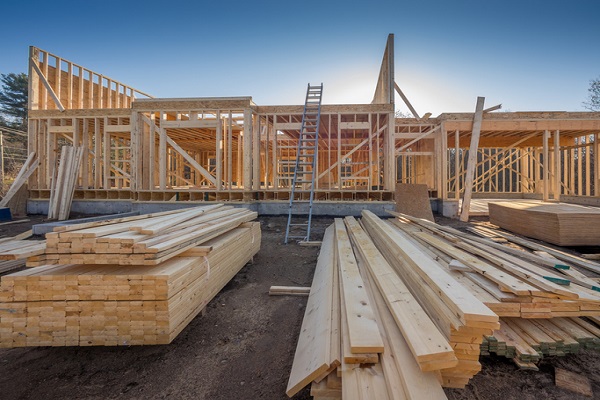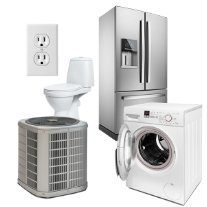New construction homes are more popular than ever before. In fact, a recent study from the National Association of Home Builders (NAHB) found that 60% of buyers would prefer a newly built home over an existing one. If you’re looking for a new construction home, make sure you think about these questions.
Is a new construction home more expensive than an existing home for sale?
It depends. In terms of purchase price, yes, new construction homes are generally more expensive. According to a study by the National Association of Realtors (NAR), a new home costs $334,100 on average, while an existing home costs $260,000. (Geography and other factors play significant roles in local costs.)
However, new construction homes can be less expensive in the longer term, especially when they come with a high-quality builders warranty (more on that shortly).
For example, you likely won’t need to do any renovating or updating in a new home. Existing homes may have older elements that you may need to replace yourself, which can get expensive quickly.
How do I know which builder is best?
To find the best builder, you need to have an idea for what you’re looking for. Some builders can create entire communities, while others specialize in more customized work. Determining where you want to live (geographically, as well as city vs. suburbs vs. rural) is a good first step to know which builder is best for you.
Once you’ve determined your location, there are three major things to look for when vetting builders:
- Body of work and references (usually available on the builder’s website)
- Reputation, via your state attorney general (to see any complaints) and websites like Google, Facebook, and Angi (formerly known as Angie’s List)
- The kind of builders warranty they provide
Why does a builders warranty matter to me?
A builders warranty (or structural warranty) is incredibly important to owners of new construction homes for three reasons.
1. A builders warranty provides you peace of mind
And that’s not just a slick marketing phrase! Did you know that the average structural defect costs between $42,000 and $113,000 to address? Without a proven, written builders warranty, you may set yourself up for disappointment, frustration, and even financial hardship.
When you have a written warranty—and it’s important that it’s written—you know exactly who’s responsible for what when things go wrong with a new construction home. For example, if you live somewhere like Texas, where the soil moves around a lot, a warranty can protect you against structural issues caused by soil movement.
When you know who’s responsible for what when it comes to defects, it takes much of the mystery out of maintaining your new construction home.
2. A third-party warranty provides validation
One of the biggest questions homeowners ask is, “How do I know I can trust this builder to do the work right?” A third-party warranty, which is provided by someone other than the building company itself, is a good way to know the builder is trustworthy.
For example, 2-10 Home Buyers Warranty (2-10 HBW) is the leading provider of third-party warranties. To provide the best, most comprehensive warranty on the market, builders must meet certain criteria. They must have good standing and a proven, established record, for example.
The next question homeowners have when they learn this is, “If my builder has a good track record, why does a warranty matter?” The answer is that 80% of structural defects occur due to soil movement, which is out of everyone’s control. So, even the best builders who do everything right can still face risks that are out of their control.
Fortunately, a builders warranty from 2-10 HBW covers soil movement.
When a builder provides a third-party warranty from the industry leader, it tells you two things.
- The industry leader in structural coverage trusts this builder to do it right.
- If something goes wrong, the builder has provided me with the best and easiest solution.
3. A third-party builders warranty shows a commitment to quality
You want to know that your new construction home is top notch. 2-10 HBW provides the most comprehensive builders warranty on the market. It includes the following coverage:
- 1 year of coverage for defects to materials
- 2 years of coverage for major distribution systems (like venting, ductwork, pipes, and wiring)
- 10 years of structural defect coverage
So, when your builder provides a third-party builders warranty from 2-10 HBW, they’re showing you how committed to quality they are in three ways.
- Because building a quality home matters to them, they’re backing up their commitment to quality with a builders warranty.
- They’re working with and covered by the industry leader in structural coverage. That means your home and budget are in the best hands.
- If something goes wrong with the structural integrity of your home, your builder pre-emptively provided the best solution possible.
Bonus benefit: We guide you through the challenges of structural defects
No one wants a structural defect to occur, least of all, you. With a written warranty from 2-10 HBW, you know who’s responsible for addressing such issues. But how do you get that ball rolling? Where do you even start?
2-10 HBW has teams dedicated to helping you understand and work through any structural issues your home may have. So, instead of figuring out whether you’re covered, what you need to do to file a claim, or determining how you address defects all by yourself, 2-10 HBW guides you through it all.
We investigate qualified structural claims for you at no cost to you. We send high-quality, independent contractors to address qualified structural defects quickly and efficiently. And we cover the cost of addressing the defect—which again, runs between $42,000 and $113,000 on average—so you can get back to living your life.
As the industry-leading provider of builders warranties, 2-10 HBW takes pains to make sure that you and your builder are on the same page. That’s why it’s so important to ask your builder to include coverage from 2-10 HBW on your new construction home.
For more information on structural warranties, click here.
What are some pitfalls of buying a new construction home?
New construction homes are usually more expensive than existing homes up front. The cost goes up the more you personalize your home as well.
Another pitfall is that new construction homes tend to be in the suburbs or outskirts of the city. That could mean longer commutes if you have to travel to the city for work, especially if your new construction home isn’t near public transportation.
Additionally, you may feel like new construction homes lack the “character” of existing homes. It could take time to get used to the fact that there are no mature trees or fewer “shoppers rows” in newly constructed neighborhoods.
Finally, property taxes on new construction homes are usually higher than comparable existing homes. Plus, initial tax estimates on new construction homes may be inaccurate on the low end, since assessors usually estimate them before the home is complete.
Which upgrades are worth it?
One of the biggest draws about a new construction home is that you have a head start on making it your dream home. But what kinds of upgrades will help you most in the long run, in terms of increasing your home’s value and making the home more comfortable for your daily living?
Anything that can increase your home’s value in the long run or make life easier is worth investing in. For example, you may want to consider upgrading your kitchen appliances and storage space. Good appliances and ample storage space can really improve your experience of home ownership.
Likewise, a large, usable garage can do wonders for storage and space. Since many new construction homes tend to be farther away from city centers, you’ll likely need a car to get around comfortably. Plus, you’ll never complain about having the extra space that a garage can provide!
On the other hand, you may want to think twice about purely aesthetic upgrades. Things like crown molding, wood floors, and marble countertops may look good. But they either don’t do anything (crown molding) or are both expensive and hard to maintain (wood floors and marble countertops).
2-10 HBW offers the most comprehensive home warranty coverage for homeowners. Let us help you protect your home.
Related content
Home Warranties: What They Do and How They Help You








